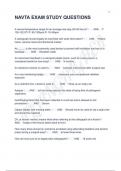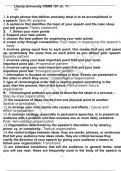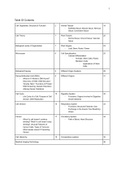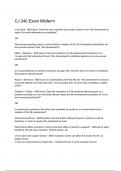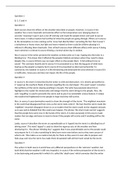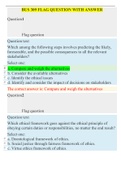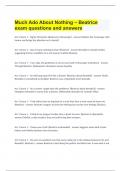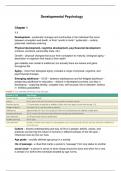Berenice Ings – Russia and its Rulers
Chapter 3: the impact of war and
revolution and the development of
the Russian empire and the USSR
Specification – extended content (mark as completed)
The effects of the following wars on government, The role of war and revolution as principal causes of
society, nationalities and the economy: the political change, development and policy.
Crimean War, the Russo-Japanese War, 1905 Extent of responsibility of Russian government and
Revolution, 1917 Revolutions, First World War, individuals for instigating or permitting the negative
Second World War, the Cold War. effects of war and conflict on Russian economy and
society:
Nicholas II and the Great War
Lenin, Trotsky and the Civil War
Stalin, the Great Patriotic War and early Cold War
the Ukraine.
Similarities and differences in wartime
economies societies during each conflict and/or the
immediate post-war period.
Impact of war and revolution on Russia during the
period on society, politics, nationalities and the
economy.
the crimean war 1853-6
long term origins
Russia wanted to resolve the Eastern question in a way that
best preserved its economic and political interests
1827- Russia decided to support an agreement with Turkey to
allow the Greeks to government themselves
the Sultan of Turkey was reluctant to stick to the agreement -
resulted in the Battle of Navarino Bay
Russian, British and French naval squadrons combined to
defeat the Sultan's naval fleet
Nicholas I agreed with the sultan that Russian merchant
shipping would have easier access through the Straits and the
Turkish seas -> 2 months later the sultan reneged on the
agreement and a full blown war between Russia and Turkey
ensued
major Russian victories in the Balkans and Caucasus
Treaty of Adrianpole signed- sultan had to honour the
Akkermann agreements; territory in the Caucasus and mouth
of the Danube on the Black Sea ceded to Russia; Danubian
principalities of Moldavia and Wallachia recognised as
temporary Russian protectorates
1
,Berenice Ings – Russia and its Rulers
the war against Turkey had bothered Nicholas I- believed it
contradicted the concept of legitimism that underpinned his
foreign policy
1833- decided to help the Ottomans in a struggle against
Egyptian rebels led by Mehmet Ali, rewarded through the
Treaty of Unkiar Skelesi
- resulted in Turkey agreeing to close the Straits to foreign
warships during times of conflict
- implied that Russian warships would be allowed to enter
the Bosphorus and the heart of the Ottoman Empire
first attempt by Russia to transform the Turkish core area into
a Russian protectorate
Russia agreed to support Turkey if it was attacked by another
of the world powers
a further revolution by Mehmet Ali culminated in the signing of
the Straits Convention 1841
as a result of pressure from the other great powers, this
weakened Russia's arrangements with the Turks
all of the major European powers conceded that Turkey should
ban all foreign warships from entering the Straits during
periods of international tensions
to clarify the confusion over the 1833 agreement, Russian
warships were banned from the Dardanelles and the
Bosphorus
this aggrieved Nicholas I as he knew that Russia was not really
in a position to go to war with any of the other European
powers - proceeded to use diplomacy to ensure that Russia's
interests in the East were preserved
short-term origins
the middle of 19th century - dispute between Russia and
France arose over Orthodox Christian and Catholic rights and
duties in the Holy Lands (part of the Ottoman Empire)
arguments over this issue escalated and sparked the beginning
of the Crimean War
before the squabble erupted Russia had persuaded the sultan
to allow special privileges to be granted to Orthodox Christians
in the Holy Lands
considered fair as Orthodox Christians represented a majority
in the region and contributed much to the local economy
1851- this arrangement was challenged by Charles Louis
Napoleon, the first president of the French Republic and
Emperor of France
stated that according to a rather obscure treaty of 1740, the
French had a moral obligation to be the sole protectors of
Christians in the Holy Lands
2
,Berenice Ings – Russia and its Rulers
desired to win back support from prominent members of the
French Catholic Church
1852- sultan agreed that Catholics should be consulted over
the restoration of the Holy Sepulchre in Jerusalem and were to
be given access to Bethlehem's Church of the Nativity
Nicholas I was understandably annoyed by the French
intervention
sent Prince A.S. Menshikov to Constantinople to obtain
confirmation of Russia's superior rights in the Holy Land
the Turks were very worried by Menshikov's claims about the
numbers of Christians and amount of territory that needed to
be controlled by Russia and refused his demands
July 1853- Nicholas retaliated by sending troops in the
principalities of Moldavia and Wallachia
requests from the turks, British and french were made for
Nicholas to backtrack however, he refused
October 1853- Turkey declared war on Russia
British and French sent fleets to the Dardanelles
March 1854- British and French declared war on Russia
August 1854- Nicholas changed his mind and withdrew forces
from the principalities in an attempt to appease his European
rivals
his actions came too late
October 1854- the siege of Sevastopol had begun
the origins of the war show the tsar's concern to preserve
Russia's status as one of the great powers
important for Nicholas to stand up to the British and French so
the Russian people maintained faith in the Romanovs and
autocracy
the background to the war showed that Nicholas had many
reservations about taking on the other powers
he was not confident that Russia had the right economic and
social infrastructure to win a major conflict
the implication was that the Russian government would have
to make some radical changes if Russia was to maintain its
standing in the world
main events
November 1853- the Russians destroyed the Turkish fleet at
Sinope - over 4000 turks were killed and the incident sparked
intense protest from Britain and France
January 1854- British and french navies positioned in the Black
Sea - British politicians were still intent on averting a full blown
war
3
, Berenice Ings – Russia and its Rulers
February 1854- Britain and France sent Russia an ultimatum to
withdraw from the principalities; ignored - British and French
now felt obliged to commit to war
March 1854- British and French declared war on Russia and
gave support to the Turks
August 1854- under pressure from the threat that Austria
might join the war on the side of the British and French, Russia
decided to pull out of the principalities - Austria proceeded to
make peace proposals, not accepted by the tsar until
November 1854. Britain showed a willingness to prolong the
war to impose further damage on Russia and force the tsar to
make greater concessions over access to the Black Sea
September 1854- Britain and France invaded the Crimea, slow
to attack the key Crimean port of Sevastopol, allowed Russian
forces to regroup within the port -> led to a siege
Battle of Alma- first major confrontation of the Crimean
campaign, Russians lost 6000 troops due to using outmoded
weaponry - other notable battles occurred at Inkerman and
Balaclava
February 1855- Nicholas I died of pneumonia; replaced by AII
October 1854 to September 1855- siege of Sevastopol - long,
drawn out affair, adverse winter conditions, fortifications of
Sevastopol and resilience of the Russian defenders
August 1856- Russians were suffering from 2000 to 3000
casualties daily
summer 1856- series of severe artillery bombardments->
Russians surrendered - the strategic importance of the port
meant that surrender was a major setback for the Russians
September 1855 to January 1856- the war petered out yet
Austria renewed threats to join the war - Russia eventually
agreed to peace talks based on the original four points plan
March 1856- Treaty of Paris signed
the impact of the war
casualties
the crimean war involved far heavier casualties than any other
European war fought between 1815 and 1914
between 650,000 and 750,000 died
- Britain lost 22,000
- France lost 90,000
- Russia lost 450,000
- Turkey lost 150,000
1/5 lost their lives in battle however, most died of disease
the treaty of Paris, march 1856
Terms of the treaty
4
Chapter 3: the impact of war and
revolution and the development of
the Russian empire and the USSR
Specification – extended content (mark as completed)
The effects of the following wars on government, The role of war and revolution as principal causes of
society, nationalities and the economy: the political change, development and policy.
Crimean War, the Russo-Japanese War, 1905 Extent of responsibility of Russian government and
Revolution, 1917 Revolutions, First World War, individuals for instigating or permitting the negative
Second World War, the Cold War. effects of war and conflict on Russian economy and
society:
Nicholas II and the Great War
Lenin, Trotsky and the Civil War
Stalin, the Great Patriotic War and early Cold War
the Ukraine.
Similarities and differences in wartime
economies societies during each conflict and/or the
immediate post-war period.
Impact of war and revolution on Russia during the
period on society, politics, nationalities and the
economy.
the crimean war 1853-6
long term origins
Russia wanted to resolve the Eastern question in a way that
best preserved its economic and political interests
1827- Russia decided to support an agreement with Turkey to
allow the Greeks to government themselves
the Sultan of Turkey was reluctant to stick to the agreement -
resulted in the Battle of Navarino Bay
Russian, British and French naval squadrons combined to
defeat the Sultan's naval fleet
Nicholas I agreed with the sultan that Russian merchant
shipping would have easier access through the Straits and the
Turkish seas -> 2 months later the sultan reneged on the
agreement and a full blown war between Russia and Turkey
ensued
major Russian victories in the Balkans and Caucasus
Treaty of Adrianpole signed- sultan had to honour the
Akkermann agreements; territory in the Caucasus and mouth
of the Danube on the Black Sea ceded to Russia; Danubian
principalities of Moldavia and Wallachia recognised as
temporary Russian protectorates
1
,Berenice Ings – Russia and its Rulers
the war against Turkey had bothered Nicholas I- believed it
contradicted the concept of legitimism that underpinned his
foreign policy
1833- decided to help the Ottomans in a struggle against
Egyptian rebels led by Mehmet Ali, rewarded through the
Treaty of Unkiar Skelesi
- resulted in Turkey agreeing to close the Straits to foreign
warships during times of conflict
- implied that Russian warships would be allowed to enter
the Bosphorus and the heart of the Ottoman Empire
first attempt by Russia to transform the Turkish core area into
a Russian protectorate
Russia agreed to support Turkey if it was attacked by another
of the world powers
a further revolution by Mehmet Ali culminated in the signing of
the Straits Convention 1841
as a result of pressure from the other great powers, this
weakened Russia's arrangements with the Turks
all of the major European powers conceded that Turkey should
ban all foreign warships from entering the Straits during
periods of international tensions
to clarify the confusion over the 1833 agreement, Russian
warships were banned from the Dardanelles and the
Bosphorus
this aggrieved Nicholas I as he knew that Russia was not really
in a position to go to war with any of the other European
powers - proceeded to use diplomacy to ensure that Russia's
interests in the East were preserved
short-term origins
the middle of 19th century - dispute between Russia and
France arose over Orthodox Christian and Catholic rights and
duties in the Holy Lands (part of the Ottoman Empire)
arguments over this issue escalated and sparked the beginning
of the Crimean War
before the squabble erupted Russia had persuaded the sultan
to allow special privileges to be granted to Orthodox Christians
in the Holy Lands
considered fair as Orthodox Christians represented a majority
in the region and contributed much to the local economy
1851- this arrangement was challenged by Charles Louis
Napoleon, the first president of the French Republic and
Emperor of France
stated that according to a rather obscure treaty of 1740, the
French had a moral obligation to be the sole protectors of
Christians in the Holy Lands
2
,Berenice Ings – Russia and its Rulers
desired to win back support from prominent members of the
French Catholic Church
1852- sultan agreed that Catholics should be consulted over
the restoration of the Holy Sepulchre in Jerusalem and were to
be given access to Bethlehem's Church of the Nativity
Nicholas I was understandably annoyed by the French
intervention
sent Prince A.S. Menshikov to Constantinople to obtain
confirmation of Russia's superior rights in the Holy Land
the Turks were very worried by Menshikov's claims about the
numbers of Christians and amount of territory that needed to
be controlled by Russia and refused his demands
July 1853- Nicholas retaliated by sending troops in the
principalities of Moldavia and Wallachia
requests from the turks, British and french were made for
Nicholas to backtrack however, he refused
October 1853- Turkey declared war on Russia
British and French sent fleets to the Dardanelles
March 1854- British and French declared war on Russia
August 1854- Nicholas changed his mind and withdrew forces
from the principalities in an attempt to appease his European
rivals
his actions came too late
October 1854- the siege of Sevastopol had begun
the origins of the war show the tsar's concern to preserve
Russia's status as one of the great powers
important for Nicholas to stand up to the British and French so
the Russian people maintained faith in the Romanovs and
autocracy
the background to the war showed that Nicholas had many
reservations about taking on the other powers
he was not confident that Russia had the right economic and
social infrastructure to win a major conflict
the implication was that the Russian government would have
to make some radical changes if Russia was to maintain its
standing in the world
main events
November 1853- the Russians destroyed the Turkish fleet at
Sinope - over 4000 turks were killed and the incident sparked
intense protest from Britain and France
January 1854- British and french navies positioned in the Black
Sea - British politicians were still intent on averting a full blown
war
3
, Berenice Ings – Russia and its Rulers
February 1854- Britain and France sent Russia an ultimatum to
withdraw from the principalities; ignored - British and French
now felt obliged to commit to war
March 1854- British and French declared war on Russia and
gave support to the Turks
August 1854- under pressure from the threat that Austria
might join the war on the side of the British and French, Russia
decided to pull out of the principalities - Austria proceeded to
make peace proposals, not accepted by the tsar until
November 1854. Britain showed a willingness to prolong the
war to impose further damage on Russia and force the tsar to
make greater concessions over access to the Black Sea
September 1854- Britain and France invaded the Crimea, slow
to attack the key Crimean port of Sevastopol, allowed Russian
forces to regroup within the port -> led to a siege
Battle of Alma- first major confrontation of the Crimean
campaign, Russians lost 6000 troops due to using outmoded
weaponry - other notable battles occurred at Inkerman and
Balaclava
February 1855- Nicholas I died of pneumonia; replaced by AII
October 1854 to September 1855- siege of Sevastopol - long,
drawn out affair, adverse winter conditions, fortifications of
Sevastopol and resilience of the Russian defenders
August 1856- Russians were suffering from 2000 to 3000
casualties daily
summer 1856- series of severe artillery bombardments->
Russians surrendered - the strategic importance of the port
meant that surrender was a major setback for the Russians
September 1855 to January 1856- the war petered out yet
Austria renewed threats to join the war - Russia eventually
agreed to peace talks based on the original four points plan
March 1856- Treaty of Paris signed
the impact of the war
casualties
the crimean war involved far heavier casualties than any other
European war fought between 1815 and 1914
between 650,000 and 750,000 died
- Britain lost 22,000
- France lost 90,000
- Russia lost 450,000
- Turkey lost 150,000
1/5 lost their lives in battle however, most died of disease
the treaty of Paris, march 1856
Terms of the treaty
4

